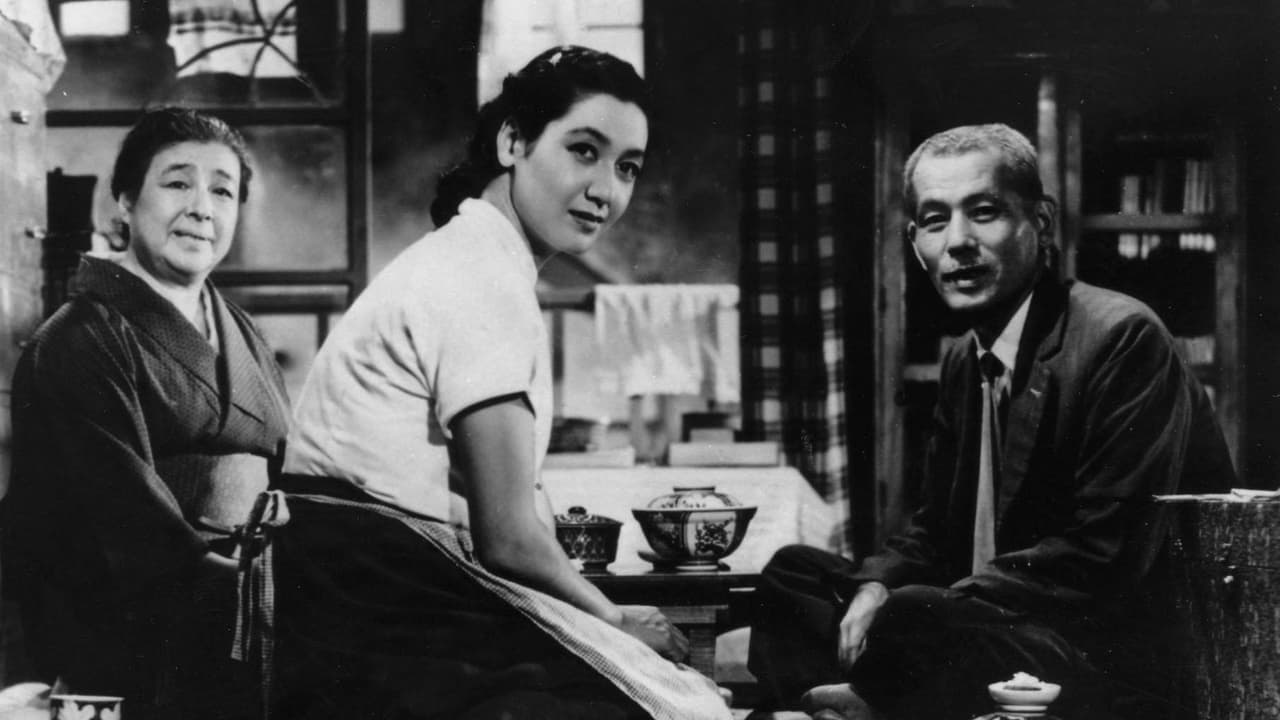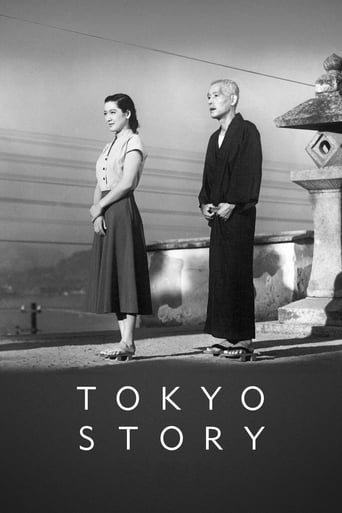

I don't know if it has to do with some of the translation into English, but some of the dialog in this film seems to me to be plainly offensive. For example, when the old woman Tomi Hirayama (Chieko Higashiyama) speaks to her daughter-in-law Noriko (Setsuko Hara), who's husband, the older woman's son, had died, she makes the remark "What a treat to sleep in my dead son's bed". What??!! I thought that was terribly insensitive.Or when the family members discuss the mother's passing, Shige (Haruko Sugimura) states that she wishes the old man had died first. She qualified her statement with a logical reason, but gee, that just sounded so awful bad, but in her case, Shige had already established that she wasn't very politically correct among her family members.And then there's the old man himself, Shukichi (Chishû Ryû), who attempts to convince his daughter-in-law Noriko to remarry. With seeming indifference to the death of his own son a year earlier, he says "Forget about Shoji, he's dead." Do you think Noriko had to be reminded of that depressing fact? I know this, a movie is getting to me when I have to get up and pace around the room in order to force myself to stay with it. I pretty much understand what the director was trying to achieve here by showing the indifference siblings can show toward their elderly parents. How they'd rather not be bothered unless there's something in it for them. And obviously I'm at a disadvantage by not knowing the Japanese culture and it's approach to the concept of dying. But this just didn't strike me as being the noteworthy film it's hailed to be with it's position in the IMDb rating system. Sometimes I find a second viewing of a film to help with my appreciation of the effort, but this one I'll be giving a pass.One final observation - what's the obsession with fanning one's self throughout the picture?
... View MoreFirst InThis Film Camera Working Very Good, In Start You Can See Three People Sitting In The Room In Different Situation In One Shut, The Old Woman Is Talking His Husband Is Listening & Thinking And The Young Girl Is Packing Own Food For Her Work, I Can See A Lot Good Depth Of Field In Tokyo Story, And I like Another Scenes When Three Old Friend Sit In Bar And Talking About Own Children's And They Just Complained About It ,One Of Them Lost Two Boys In War Another One Not Happy With His Son But The Oldest Lost His Boy In War Too & Not Happy Too And They Talk And Drink To Forget They Miserable Life , This Film Is About Real Respect To What We Have And We Don,t Even See, Parents , Family . In One View Father And Mother Sit Next The Big Door House And Talking About Come Back To Own City Or Village With Train, And I Think Ozu This View Meaning The Reall Place For Them Is Something Big Like This Door That They Can Live There And They Need Company For Rest Of Life, Just Respect Them , Our Parents.
... View MoreAn elderly couple head to Tokyo to spend a few days with their children and grandchildren. While their children are initially glad to see them, and the parents are models of patience and pleasantness, the novelty wears off pretty quickly for the children and they soon view the parents as a hindrance more than anything else. Then an event highlights the divide between the two generations...Engaging and emotional drama from famed Japanese director Yasujiro Ozu. It wasn't always looking like it was going to be that great though. While always engaging, the pace is very slow at the beginning. The first 60% or so is all scene-setting - Act 1 essentially. Things ramp up once the aforementioned event occurs, and this makes the wait worth while.Quite emotional, ultimately, and quite balanced in its views. It looked like it was going to be fairly judgmental in its observations, but the final few scenes add a different perspective. Having a character that was able to see both sides of the issue helped a lot.Not quite the masterpiece it is made out to be, but very good nevertheless.
... View MoreThis may not be my favorite movie of all time. This may not be the best movie of all time. But this is the most perfect movie of all time.It's complex yet simple. It's easily understandable, yet every viewing yields something new. It stands in the past and looks at the future. Or maybe, it stands in the future and looks towards the past. It is the most Japanese of all the great Japanese films. It is a film that is still remembered after sixty-three years. It is a film that will still be remembered after sixty-three more.It is, in my opinion, the greatest non-English language live action film of all time.This is Tokyo Story.I recommend that everyone watch this movie. But there are some things you should do first. Watch some Kurosawa films. Watch some Ghibli films. Read up on the culture of Japan. Learn what a pillow shot is. Then come back and pop in this flick.There are stories that translate across cultures and generations. This is where the Hero's Journey and the Monomyth come from. But there are also stories that are specifically tied to one culture or another, that are engrained in that culture for all they are worth. One can watch them without knowing anything about their culture of origin, but the experience is... lessened.This is one of those stories.The plot is basic. An elderly couple comes to visit their kids in Tokyo, but their kids are too busy, and send their parents to a bathhouse. At its basis, this could be construed as your basic 'take care of your elders' story. But that is not doing the story justice. That is like calling LotR a basic 'kill the evil guys trying to take over the world' story.These characters are so complex, but their complexities do not get in the way of emotional power. At the end of the movie, after a potent climax, the characters gather together, and you feel for every single one of them. That is impressive.And that is just the tip of the iceberg. There are so many little intricacies to be loved about this movie. This is cinematic poetry in every meaning of that term. There are movies- movies I like and respect- where I say to myself, "I could do better than that." I never once thought that when watching this movie. The dichotomy between simplicity and complexity is shown even in the title of the movie. Tokyo Story is about the simplest possible title anyone could think of for this movie. It is like naming a song ___ Song. But it is also deep. Tokyo is one of the most storied cities of all time, and at the time of this movie's release, it was just starting to recover from the massive firebombing campaign the United States waged on it in the closing days of World War II.I think of this title like a fancy door. On the surface, it is simple and functional. And if that is all someone wants to take out of it, so be it. But if one looks deeper, they can see a whole new level of symbolism and detail.Remember when I said to look up what a 'pillow shot' is. There's a reason for that. Ozu uses these to great effect, giving the audience a chance to breath and compose themselves. It is a very Japanese way of doing things. I'd love to see what would happen if pillow shots were included in their next mainstream blockbuster. But I doubt that anyone who is interested in this movie in the first place would be put off by its Japan-ness.Typically, I don't talk about the use of restraint in film- it is important, integral even but no one comes to see a film because of its effective use of restraint- but I must make an exception for this film. This is a film requiring perfect balance in every respect. If one side or viewpoint became too overpowering, the movie would no longer be one of the greatest movies of all time. It would be simply great. Vast oceans of restraint are needed at every turn. Good thing the director is Ozu.But even with all its perfections, I would not love this film nearly as much as I do if not for how much I love who the characters become and what they have to say. They do not just feel alive. They feel importantly alive. The best example of this comes when three aging businessmen sit at a bar and talk about their children. In some movies, this would be a cheap throwaway joke. In others, it would a cheap attempt at melodrama. But in this movie, it results in one of the most profound discussions I've ever heard in a movie. I was awestruck.That is the second-best scene in the movie, at least in my opinion. The best comes at the very end of the movie. I won't spoil it, but no one who watches this movie closely is unaffected by it. It captures the tone of this movie as perfectly as any scene can capture the tone of any movie.Melancholy without being depressing, insightful without being preachy, fascinating without needing to be flashy, this is one of the greatest pieces of mature, adult, thoughtful art that has ever been produced.
... View More